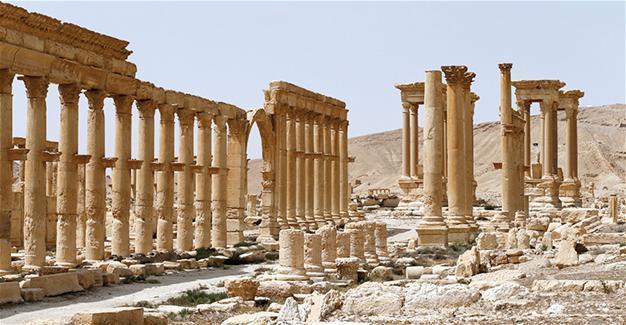ISIL, Syria’s Russian-backed army fight over Palmyra
AMMAN
 Islamic State of Iraq and the Levant (ISIL) militants and Syria’s Russian-backed army fought over the ancient Syrian city of Palmyra on Dec. 11, with both sides claiming the upper hand.
Islamic State of Iraq and the Levant (ISIL) militants and Syria’s Russian-backed army fought over the ancient Syrian city of Palmyra on Dec. 11, with both sides claiming the upper hand. Russia said its jets had helped force the militants out of the city center overnight, and its allies in the Syrian army were now fighting off another assault by the hardline Islamists.
But a news agency linked to ISIL said it had only briefly retreated and was now back in control of Palmyra, an account backed by the British-based Syrian Observatory for Human Rights, which monitors the conflict, Reuters reported.
Palmyra, the site of a Roman-era city and spectacular ruins in the center of Syria, has become an emblematic battleground in a civil war now in its sixth year.
The Russian Defense Ministry said its jets had launched 64 strikes and killed more than 300 militants overnight, helping the Syrian army push the main force back.
The Syrian army acknowledged there was a large offensive by the militants from several fronts near a major grain silo 10 kilometers (6 miles) east of the city.
An ISIL recapture of Palmyra would be a major reversal for Syria’s government and its Russian backer which hailed the city’s capture in March, sent troops to protect it and even staged a concert there.
The fight could also have implications for other battlegrounds in Syria.
The Syrian army said on Dec. 10 it had sent reinforcements to Palmyra to help defend it. Some of those were diverted from Aleppo, a rebel from the countryside outside that northern city said, a development that could ease pressure on rebels there.
In Aleppo, air strikes pummeled the shrinking rebel enclave in east Aleppo as U.S. Secretary of State John Kerry said the Syrian regime’s “indiscriminate bombing” amounted to crimes against humanity.
Western powers meeting in Paris called for peace talks to resume and for civilians to be allowed to leave Aleppo, where tens of thousands have already fled the offensive.
Speaking in Paris, Kerry said the regime’s “indiscriminate bombing” of Aleppo amounted to “war crimes” and “crimes against humanity” and he called for Russia and Assad’s other backers Iran to show “a little grace” and help end it, AFP reported.
“I had two communications today that confirmed that he [Assad] has said that he will, in fact, take part and be there in good faith and begin the negotiations,” Kerry said, adding: “We’ll see what happens.”
American and Russian officials were due to gather in Geneva on Dec. 11 for what Kerry called a bid to stop Aleppo “being absolutely, completely, destroyed.”
Aleppo has witnessed some of the most brutal violence of Syria’s nearly six-year war.
In less than a month, forces loyal to Assad have overrun around 85 percent of east Aleppo, a rebel stronghold since 2012.
U.N. Syria envoy Staffan de Mistura said the world is watching “the last steps” in the Aleppo battle and evacuating civilians must be a priority.
Air strikes and regime rocket fire battered the last remaining rebel districts Saturday, the Observatory said.
The strikes were so intense that windows in the west rattled.
After meeting opposition representatives on Dec. 10, which included Riad Hijab, representing the opposition, French Foreign Minister Jean-Marc Ayrault said the opposition was willing to resume peace talks “without pre-conditions.”
However, a diplomatic source told AFP the opposition required a political transition in Syria before it would agree to take part.
“There can be no military solution in Syria,” British Foreign Secretary Boris Johnson said in Paris, urging “a return to a political process with the credibility necessary for all parties to commit to an end to all the fighting.”
German Foreign Minister Frank-Walter Steinmeier said: “We demand that the regime, but also Iran and Russia, let people leave the conflict zone.”
















